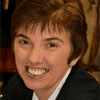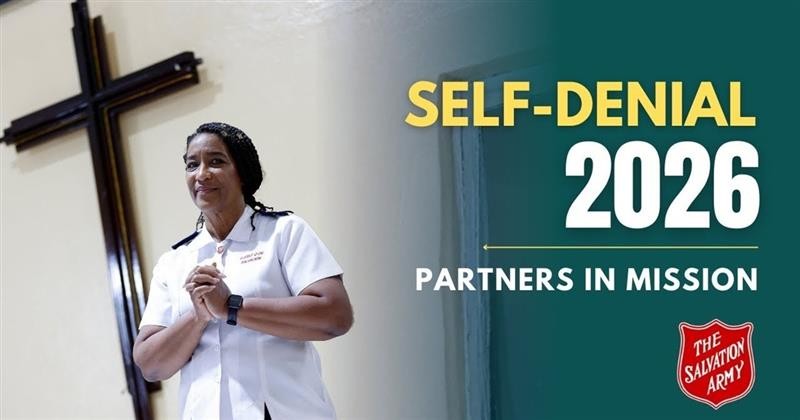 Not too long ago, I walked away from a conversation that left me feeling somewhat unsettled. The essence of the exchange had centered on whether it was appropriate for a Salvationist preacher to call people to the mercy seat following the sermon. “My faith is a private affair,” this person argued. “It's personal to me and I am just not comfortable making my convictions public.” Time did not permit me the opportunity to offer all that I wanted to say but the comment invited some further thought on my part.
Not too long ago, I walked away from a conversation that left me feeling somewhat unsettled. The essence of the exchange had centered on whether it was appropriate for a Salvationist preacher to call people to the mercy seat following the sermon. “My faith is a private affair,” this person argued. “It's personal to me and I am just not comfortable making my convictions public.” Time did not permit me the opportunity to offer all that I wanted to say but the comment invited some further thought on my part.
I wondered what was within this person's background that had led to the forming of this perspective. What would inhibit a desire to make ones convictions public? Had there been negative experiences of the mercy seat in the past? Had there been undue pressure applied so that it no longer seemed a “safe place” to pray and seek God? Had some well-meaning saint pronounced judgment, alleging something this person must have done wrong, thus invading what should have been a sacred encounter? Did this person even fully understand what the mercy seat represents?
The concern my conversation partner raised is not one that should really catch us off guard. After all, society is continually reminding us of the importance of protecting people's privacy. In Canada, both federal and provincial laws regulate how personal information is collected and how such information can be used. Even within our emails we may often stumble across a proviso that says: “the contents of this message is privileged and may contain confidential information intended only for the person(s) named above. Any other distribution, copy or disclosure is strictly prohibited.” All of this comes our way for good reasons as we recognize the attempts of many corrupted minds to benefit from the personal identity and privileged information of others.
There is more, however, to this debate. Political scientist Robert Putnam argues that the nature of social relationships is under significant re-shaping in this day and age. This has had huge impact on how people connect and function within community. Quoting Putnam directly, he says, people are now “bowling alone,” meaning that young adults today are way more likely to choose activities that put themselves in selective isolation versus mingling and mixing in community (i.e. how many hours do people spend in front of the TV or playing video games?). Even checking facebook can become a selective activity, where you pick and choose with whom you connect. If you don't like someone, you just block them as a friend and ultimately we keep control of our community! (Interestingly, sitting in the context of Sunday morning worship, this is a little more challenging to do!) The point in all of this is an identifiable trend which seems to be surfacing. We are becoming a society that is distant from itself. Robert Wuthnow in After the Babyboomers, quotes a middle aged women living in the suburbs who describes her life this way: “We get in our car and go to Wal-Mart or work. We're so segmented. We don't see our neighbors. We don't even have a five minute meaningful conversation with folks. I didn't even realize our next-door neighbors went to our church. We'd been there almost three years before we met them.”
At the heart of this, it would seem we look for ways to control who we let in and out of our personal space. The great tragedy in this is that we have regretfully become a society that will not easily trust. So maybe my conversation partner came by the perspective honestly to say “faith is a private affair.” Making our convictions public can seem to some a daunting invitation and fear of censorship or invasion of personal space can compromise the intent of what is really being offered.
While this may seemingly be the “way of the world,” it is not the way of the Gospel. Can you imagine if the good news of the resurrection had remained a private affair? Visualize the women making their way to the tomb on that first Easter morning. Overwhelmed by their grief, they come face to face with the angel. They hear the message clearly, “Don't be afraid. You're looking for Jesus right? Well – here's the 411. He's not here! He is risen! Come and see it for yourselves! But be warned ladies, you must keep this absolutely confidential. Do not breathe a word of this to anyone. This resurrection is a private matter! Tell absolutely no one.”
While offered “tongue in cheek,” the point in all of this is that if the resurrection had played out in this way, you and I would not be the recipients of this good news today and we would not know the joy of Easter celebration. When the invitation is given to step forward to a Salvation Army mercy seat, it is the Salvationist's sacramental opportunity to outwardly demonstrate the inner workings of grace. It is a place, in the context of corporate worship, where we can make our faith visible and give testimony to that which we believe. Interestingly, as Nigel Bovey in The Mercy Seat argues, it becomes the Salvationist's communion table where we come together as a family of believers to affirm our common experiences and beliefs. It is that place where we can pray and seek God. It is that place where the sinner can make things right with God. It is a privileged place of worship that has no barriers or limitations. It is a place to “make our faith public.” I wonder if that's what Jesus had in mind when he sent out the Twelve and he said “Whoever acknowledges me before men, I will also acknowledge him before my Father in heaven.” (Matt. 10:32a) Maybe it helps us to make further sense of Jesus' rhetoric about being “salt and light.” Interestingly one of the first places we may have opportunity to do that is next Sunday morning when the invitation is given to the mercy seat following the sermon. May God help us to expand our mercy seat theology to see it as more than just a place where sinners repent and believe the Gospel. What happens around The Salvation Army altar can be the crowning glory of all our worship as we jointly affirm “I know in whom I have believed!” May God help us not to be strangers to this sacred place and at every opportunity we have, let us not fear to make our faith public!
 Major Julie Slous is corps officer at Winnipeg's Heritage Park Temple. She also serves as adjunct faculty at the College for Officer Training. In May 2009, Julie completed her doctoral studies in biblical preaching. Her thesis work centred on “Preaching a Disturbing Gospel─The Homiletic of The Salvation Army for Postmodern Times.” When not studying and writing, personal hobbies include reading, cooking, musical composition and, of course, listening to sermons! Married to Brian, she has three children.
Major Julie Slous is corps officer at Winnipeg's Heritage Park Temple. She also serves as adjunct faculty at the College for Officer Training. In May 2009, Julie completed her doctoral studies in biblical preaching. Her thesis work centred on “Preaching a Disturbing Gospel─The Homiletic of The Salvation Army for Postmodern Times.” When not studying and writing, personal hobbies include reading, cooking, musical composition and, of course, listening to sermons! Married to Brian, she has three children.









If the mercy seat is perceived as an unsafe place to go, it seems to me that this belief is an indictment of one's fellow Christians and also of one's officers. The officers, as leaders, can make the mercy seat a safe place or an unsafe one. Think about it.
God placed us in a family of believers; He did not tell us that the way of Christianity is a solitary one. His reasons were, as always, sound. If we do not speak of our struggles, either in word, deed or behavior, how will any of us know that the struggles we face are common or even how to overcome them? How will we know what is available to us as members of God's family if we don't see what God is giving other family members? What does forgiveness look like? What does holiness look like? What does marriage look like? How will we know if we don't see? We overcome “by the blood of the Lamb and the word of [our] testimony”.
Seriously, do you want to be a member of a corps where everyone pretends that their lives are perfect and they don't need God or each other? What kind of pride does that display to one another? What kind of testimony is that to the world? We are imperfect people and we are all struggling as God works within each of us. Why should we believe that truth is a thing to be ashamed of and hidden? God's saving power at work in us needs to be celebrated, not hidden.
Your sister in Christ,
Karen Osborne